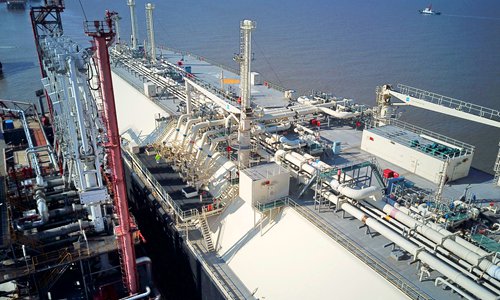
A tanker carrying LNG from Australia seen at Jiangsu LNG terminal in January, 2018 (Photo: VCG)
If the US administration was trying to scare foreign companies away under its "America First" agenda, it may have succeeded hugely.
A new survey shows that global corporate chief executives have dramatically diverted their growth plans away from the US, while countries such as Australia have seen their popularity among CEOs rising significantly.
Australia appears to be the most popular among Chinese CEOs, emerging from outside the top 10 most important markets for Chinese companies last year to No.1 this year, according to the survey released by global consulting firm PricewaterhouseCoopers (PwC) on Wednesday.
Of the Chinese CEOs surveyed, 21 percent said Australia would be the most important market outside of China for their companies' growth prospects over the next 12 months, while only 17 percent chose the US, compared with 59 percent in 2018 and 57 percent in 2017, the survey showed.
China and the US have been locked in a trade standoff and US officials have also intensified their scrutiny of Chinese companies and investments citing so-called "national security concerns," dragging down Chinese investments in the country.
Chinese direct investment in the US fell 84 percent year-on-year to a mere $4.8 billion in 2018, the lowest level in more than seven years, according to data from US consultancy Rhodium Group.
"Even if Chinese investments were allowed in some areas in the US, there were just too many risks for Chinese companies, given the policy uncertainty under this US administration," said Zhao Gancheng, director of the Center for Asia-Pacific Studies at the Shanghai Institute for International Studies.
That appears to be the case for other global CEOs as well. The PwC survey showed that only 27 percent of global CEOs said the US would be one of their three top markets for growth, compared with 46 percent in 2018, the survey showed.
However, the US remained an important market for most global CEOs followed by China, which saw a much smaller drop in its popularity - from 33 percent last year to 24 percent this year.
More stability?
The rise in Australia's popularity among Chinese CEOs didn't come without uncertainty. China-Australia relations have also at times seen turbulence, with the latter periodically - and some in China have said - criticizing China without justification on a wide range of issues.
In a move that sent chills through Chinese technology companies last year, Australian officials heeded calls from their US counterparts in imposing a ban on Chinese telecom firm Huawei Technologies Co from supplying 5G equipment in the country.
"If you look at the political and trade aspects, Australia is hardly an ideal choice. Politically, it falls in line with the US on many issues; trade-wise, the Australian market is just a fraction of that of the US," Zhao told the Global Times on Wednesday. "Australia is not a safe haven for Chinese companies given the rising anti-China sentiment there."
Still, a bilateral trade agreement and some Australian local governments' welcoming attitude toward Chinese investments appear to be reassuring for some Chinese CEOs, Zhao noted. He said Chinese investment in Australian mining and agriculture is "generally welcomed" by local governments.
While large Chinese deals in Australia have been facing tougher scrutiny, many Chinese investors continue to eye smaller businesses such as ranches and vineyards, according a Chinese student in Melbourne, who has been hired by "many Chinese businessmen" to help with everything from translation to booking hotels.
"Sometimes, there are so many that I have to find other students to help out," the student, who requested anonymity, told the Global Times.
"There is a lot of negative news about Chinese investments and even us Chinese students, but so far everything is normal," the student said.


